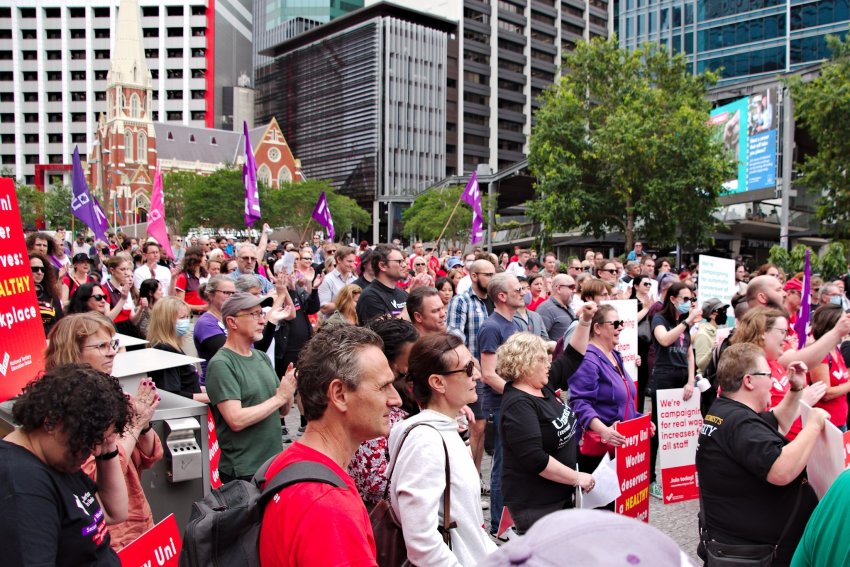
The number of workers taking strike action has risen this year, up from record lows for a decade. University workers are a part of this movement, as enterprise agreements expire and negotiations for new ones are mostly still dragging out after up to a year or more in the current bargaining round.
National Tertiary Education Union (NTEU) members at the University of Sydney have struck for a total of six days since May, most recently on October 13 and 14.
University of Technology Sydney (UTS) and University of Newcastle NTEU members stopped work in September and they struck again at UTS on October 19.
NTEU members held half-day stoppages at five Queensland universities on October 20, with a large rally in Brisbane’s King George’s Square video-linked to Rockhampton, Townsville and Cairns.
The University of Canberra NTEU struck on October 26.
As the cost-of-living crisis deepens, pay has become a pressing concern. The NTEU has twice revised its pay claims, with the standard wage claim now being a rise in line with the Consumer Price Index plus 1.5%, annually.
NTEU members are largely standing firm on the fight for real pay rises during this bargaining round. This new focus has largely supplanted a previous one on job security, in which the union set out to reduce precarious work — casual and fixed-term employment — at universities.
Job security claims were the result of universities’ rolling redundancies and their contracting out of jobs. Melbourne University activists have successfully spearheaded campaigns against wage theft and for equity measures for casual staff.
A group of younger, often precariously-employed council members have been elected to the NTEU National Council, which met on October 6‒8 — the first in-person meeting for three years.
Some sharply debated issues were won by the left.
Queer activists set out to help ensure the union’s support for transgender rights. One motion added to the union’s support for the rights of people with diverse sex characteristics and gender identities by recognising that so-called gender critical ideology, when used to defend transphobia, is not consistent with academic freedom (and therefore not defended by enterprise agreement provisions supporting academic freedom).
In line with its Aboriginal and Torres Strait Islander caucus, the union reaffirmed its long-held position to support Treaties and truth-telling and to oppose the constitutional Voice to Parliament.
Another motion recognised the Israeli state’s subjection of Palestinians to an apartheid system and settler-colonial control.
It called on members to act in solidarity with Palestinians, supporting members who engage in boycott, divestment and sanctions actions, and to oppose university policies that prohibit criticism of Israel.
The fundamentals of the NTEU’s industrial strategy, which emphasise workplace organising, were generally agreed upon.
However, difficulties in implementing the strategy remain.
Long-term membership levels remain stagnant, after a brief rise and subsequent decline during the pandemic. However, some branches that engaged in industrial action did recruit this year.
A motion supporting the exploration of open bargaining was successful, with council members supporting members being both the drivers and participants in enterprise bargaining holding sway over those arguing that negotiating “expertise” is key.
Another debate was had over the benefit of some branches claiming, and possibly winning, bigger advances in pay, compared to adhering to a national set of claims. A majority favoured the latter.
As teaching at many universities finishes for the year, the capacity to mobilise members and supportive students through work stoppages and rallies in pursuit of their claims is reduced — until next year.
Only an approach of developing a bigger, more engaged and active membership will strengthen university workers’ ability to exert power directly through industrial action.
[Jonathan Strauss is a member of the NTEU National Council. The article is written in a personal capacity.]